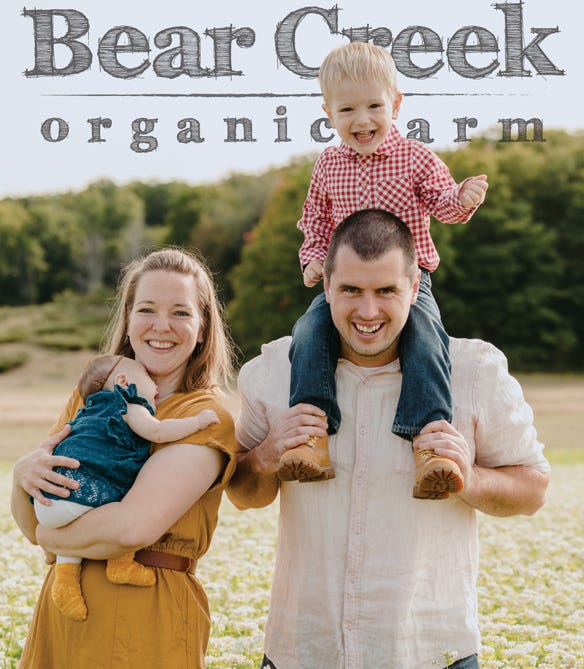May 17, 2021

In 2013, Brian and Anne Bates had a dream and a plan to bring it to fruition. Starting with bare ground and a few beehives, the couple planned to grow their organic farm to a point that after five years, one of them would be able to quit their day job.
Through tremendous amounts of sweat equity, strategic financing and adhering to principled business activities, their five-year plan turned into a two-year plan resulting in sales of $100,000. Since then, Bear Creek Organic Farm has been on a wild ride, one that business school professors consider fast growth.
Four barns and 10 greenhouses later, the farm is approaching almost $1 million in sales in only eight years. In recognition of these achievements, the Michigan State University Product Center recently awarded Bear Creek Organic Farm with its Young Innovator Award. This new award recognizes an entrepreneur who, at an early stage in their business journey, has developed an innovative product or business and has achieved excellence in their category.
Bear Creek creates consistent, high-quality fresh products — microgreens, vegetables and plant starts — that are sold to a loyal group of eager customers. Bear Creek sells more than 90% of its products within 12 miles of their Petoskey, Mich., farm, something the Bates never thought possible when they drew up their original business plans.
Guiding principles
Before they spent any capital on property, seed or equipment, the Bates made critical strategic decisions regarding principles that would guide their business. They chose northern lower Michigan as the ideal spot after weighing factors such as a desire to remain in the north and potential challenges posed by climate change.
The importance of branding and marketing were part of the farm’s core tenets, partially because of Anne’s expertise in communications and media. The Bates relied on customers to guide what they would decide to grow, and they set a plan to adapt to new tastes and preferences as quickly as possible.
Controlling their production system dictated the use of season-extension practices, allowing for virtually year-round growing in a place where lake effect snow routinely streams off nearby Lake Michigan.

YOUNG INNOVATORS: Brian and Anne Bates, owners of Bear Creek Organic Farm, are genuinely happy to be sweaty, tired and ready for the next challenge.
Many factors have helped ensure the success of Bear Creek. Operational efficiencies such as lean farming and building a team of individuals who are valued and rewarded for their contributions makes for an efficient farm with a consistent and empowered workforce.
By carefully leveraging funds from traditional and unconventional sources — including crowdfunding — the Bates were able to adequately finance growth, something that can be difficult for most startups.
Connecting with customers
Bear Creek’s focus on customers allowed them to quickly pivot on how and where they sold their products when the COVID-19 pandemic temporarily shuttered many of their main customers. In only a few short weeks, farmers markets and restaurants closed, spurring the Bates to create an online ordering system complete with contact-free farm pickup.
“The best part about moving sales to the farm is that we have the opportunity for customers to meet more of our team and see more of our farm,” Brian says. “They get to have an authentic organic farm experience, meet the humans who grew their food, and visit the farm where it was grown. It can seem like a simple thing, but the act of physically connecting eaters with their growers is powerful. It shortens the supply chain and puts a face to the food. We love that.”
Knowing what their customers valued — high quality, local organic food and a safe way to shop for it — they continued to add amenities throughout the 2020 season to what has now become a full-fledged, on-farm market. Sales in 2020 rose 33% from the previous year, and all indicators are positive for another record-breaking year.
“We’re not just showing our customers where it’s grown, we’re helping teach them how to prepare it, sharing our favorite recipes, and inspiring and empowering them to celebrate good food grown by people they trust,” Anne says. “We want people to eat as well as we get to, and we want to help them see how fun and simple food prep can be when the ingredients are fresh and full of flavor.”
Sustainability focused
The Bates are not just contributing to the success of their farm. They also are committed to a sustainable environment, thriving economy and their community. In addition to being the first USDA certified organic farm in their community, they became the first Certified B Corporation farm in Michigan in 2020.
They serve on numerous boards and committees, including Crooked Tree Arts Center, Emmet County Planning Commission, Petoskey Regional Chamber of Commerce, and Northern Michigan Small Farm Conference.
The Bates say that even though they have received recognition and accolades from local, regional and national organizations, the greatest honor bestowed on them, by far, is to serve their community and help build a better world. Anne and Brian remain future-focused. The birth of their son and daughter in recent years has heightened that focus and enhanced the deep joy they derive from working and living off the land.
Michigan State University Extension and the Michigan State University Product Center assists entrepreneurs and businesses to develop products and services in the food and agriculture markets. Product Center experts consult with clients on a one-on-one basis, helping new entrepreneurs navigate from concept development to launch and beyond.
The MSU Product Center also offers specialized services such as labeling, packaging and nutritional analysis. If you are interested in business counseling from the MSU Product Center, visit canr.msu.edu or call 517-432-8750.
Weiland is a Michigan State University Extension community food systems educator.
Source: MSU Extension, which is solely responsible for the information provided and is wholly owned by the source. Informa Business Media and all its subsidiaries are not responsible for any of the content contained in this information asset.
You May Also Like




